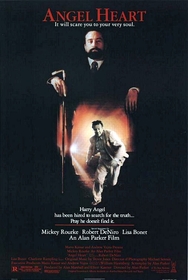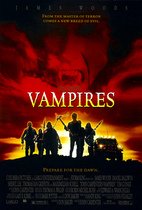Our editor-in-chief Nate Yapp is proud to have contributed to the new book Hidden Horror: A Celebration of 101 Underrated and Overlooked Fright Flicks, edited by Aaron Christensen. Another contributors include Anthony Timpone, B.J. Colangelo, Dave Alexander, Classic-Horror.com's own Robert C. Ring and John W. Bowen. Pick up a copy today from Amazon.com!
Angel Heart (1987)
It is January, 1955. A dark build-up of grime thickly coats and obscures everything in New York City from the black snow covering the streets to a bloody body in an alley. Private detective Harry Angel lives mired within that marring grime, never seeing the real face of anything.
In Angel Heart, director Alan Parker (Pink Floyd: The Wall, Midnight Express, The Commitments) delivers a provocative, intense and horrifying thriller in the best traditions of both Raymond Chandler and Clive Barker. Based upon the novel Falling Angel by William Hjorstberg, Angel Heart begins as a gritty, dime store whodunit and quickly takes on dark, supernatural overtones. Black magic, murder and sexual taboos turn a routine “hundred and twenty-five dollar a day missing persons case” into an eye opening and shocking ordeal for Harry Angel.
Angel, played by the appropriately grimy and perfectly cast Mickey Rourke, is approached by a mysterious Monsieur Louis Cyphre, played with a relaxed, but focused intensity by Oscar winner Robert DeNiro. (A sly piece of foreshadowing: regardless of how many times he hears it, Angel can never seem to remember the correct, French pronunciation of Cyphre’s name.) M. Cyphre tasks Angel with uncovering the whereabouts of a certain debtor by the name of Johnny Favorite. Favorite was a singing sensation before World War II but had come back a vegetable after suffering massive, appearance altering injuries. Cyphre claimed to have “helped” Johnny Favorite early in his career and the debt owed him from the crooner had never been reconciled. Cyphre had been receiving weekly statements from Favorite’s doctors for twelve years until they suddenly ceased. Cyphre tells Angel that he doesn’t like “leaving accounts unsettled.”
As the intrigue builds, a trail of some subtle and some glaringly obvious clues lead Angel to New Orleans and closer to Johnny Favorite. As much as the New York grime covered and obscured the truth, the New Orleans rains wash it to the surface. As Harry Angel learns though, the truth about Johnny Favorite comes washed only in torrents of blood.
As the bodies of Favorite’s former acquaintances begin to pile up in an increasingly grisly series of murders, Angel chips away at the truth. A number of epiphanies begin to occur to the gumshoe. The first comes in the form of Epiphany Proudfoot, daughter of a secret lover of Johnny Favorite’s before the War. Epiphany, Lisa Bonet in her feature film debut, is a sharp, sexy, seventeen year-old single mother who just happens to share her late mother’s calling as a voodoo priestess. Attraction to the dark undercurrents of our world and the next run in the Proudfoot family and the closer Harry gets to Epiphany, the deeper he slides into those undercurrents, deeper toward the truth. As the connections between Satanism, Johnny Favorite and Epiphany Proudfoot come together in a violent, sexual cataclysm, Harry Angel finally comprehends the awful truth. As we see the final image of an elevator going down for the last time, we know along with Harry Angel, where Johnny Favorite really is.
Alan Parker paints a picture that is rich, dark and dank. While his flashy visual style may seem like sloppy editing, it poetically leaves a viewer with an odd, disorienting series of partial memories that blur in and out of one another. His script is equally as clever, if at times in need of tightening. Many small snippets of dialogue including the metaphorical rhetoric of Cyphre and the constant self-contradiction of Angel are easy to overlook in a single viewing. The dialogue gives lots of clues just like the ones Harry Angel has to work with: some subtle, some glaringly obvious.
Angel Heart has always had the unfortunate stigma of being the scandalous, raunchy debut of Cosby kid Lisa Bonet. That preconception does a disservice to the film and the actress. Bonet is well cast and very comfortable in the role. While maybe not Oscar caliber, her acting abilities are more than sufficient and hold up to the test quite well. While the press on this film mostly went to Bonet, the real treat of the film is Robert DeNiro. While not his most demanding role, he gives brooding grace and charisma to Cyphre that would be hard to match by another actor. His limited yet potent presence fuels the film’s fire.
The sex in Angel Heart is intense, in your face and may seem at a glance tawdry and pandering to the lowest common denominator. While it may be graphic and over the top, the sex in Angel Heart is very important to the story. Sexual tension builds alongside the unraveling mystery, culminating in the film’s single, climactic sex scene. That one scene is raw in its lascivious brutality, but it solidifies the bond between evil of the flesh and evil of the soul.
Even if you aren’t familiar with the work of 16th century writer playwright Christopher Marlowe, you will most likely recognize the Faustian theme of Angel Heart. Alan Parker remains true to the core story of a deal with the Devil, but gives it a kick and twist. “Mephistopheles is a mouthful in Manhattan,” says Cyphre. In Angel Heart, the name has gotten around anyway. That’s a bad thing for Harry Angel, but a treat for any viewer in the mood for something a little gritty, a little steamy, and a lot devilish.
Trivia:
The actual train used in the 50s on the New York to New Orleans run was used in filming. It no longer ran, so it was pushed from behind by another engine.
Mickey Rourke was not auditioned for the film. He was cast after spending the day walking around New York City with director Alan Parker.









Such a great mysterious film.
Such a great mysterious film. One of the best neo noir films I ever watched. Also reminds on classic noir films. Mickey Rourke is great hard boiled detective